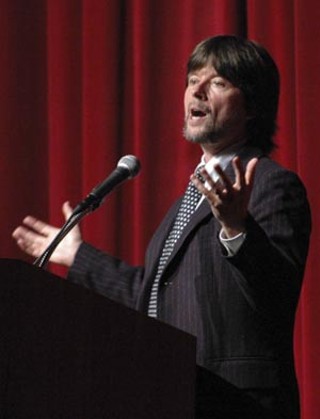TV Eye
Race, Class, and 'War'
By Belinda Acosta, Fri., Sept. 21, 2007

Unlike what KenBurnsHatesMexicans.com implies, I don't think Ken Burns hates Mexicans. No, hating Mexicans or other Latinos would mean giving them some amount of thought in the first place. From all indications, Latinos and Mexicans are invisible to Burns and, therefore, unworthy of mention in his newest documentary, The War. Yes, there are a couple of Latino and Native American testimonies thrown in, following protests from groups like the Defend the Honor campaign after early screenings indicated that the Latino presence in The War was negligible. Those additions are welcome, but whether they will quell critics is yet to be seen. After sitting through the 15-hour series, I have my doubts. Burns, his Florentine Films, and PBS (which airs the series) responded to the criticism defending artistic freedom and declaring a respect for the filmmakers' vision. The Burns camp said they did not set out to tell all the stories of this vast war. Instead, they focus on four quintessential cities: Mobile, Ala.; Waterbury, Conn.; Luverne, Minn.; and Sacramento, Calif. (no Mexicans in California?). They say they wanted to put a human face on the war. They wanted to tell the first-person accounts of soldiers and their loved ones who lived through that period, not hear about it from historians or high-level military men alongside diagrams of troop movements, maps, and descriptions of strategic maneuvers. All well and good, except that after 15 exhausting hours, it's clear that the real star of the The War is the Burnsian narrative style: provocative images, moving music, letters (there have to be letters), and, in this case, some first-person reportage from various journalists. And yes, there are maps and arrows and discussion of war strategy – not by the eschewed historians – but by the Keith David narration. The first-person accounts add vividness, but as critics point out, they also offer a highly insular view. While Burns purposely included narratives on racism from African-Americans and Japanese-Americans, those stories are served hermetically. In The War, racism is bad, and racism hurts, but after it was said and done, everyone lived happily ever after. God bless America.
That The War fails to make a link to the present is the biggest disappointment of the documentary. And isn't that what the real value of a project like The War should be? The War looks at World War II, as it does racism – forget about class, the great unspoken topic in the U.S. – as a snapshot of a powerful moment in history, detached from the present. Which in a weird way explains the omission of Latinos from The War. At this moment in time, when the hysteria around the "Mexican threat" is at an all-time high, it's no wonder Latinos are excluded from Burns' latest opus. It's messy. Like those who are more willing and able to help the poor across the globe while detesting the homeless person panhandling down the street, it's easier to deal with racism and the obscenity of war if it's something said and done in the past. To include the very real contribution of Latinos in World War II means not only being educated on why that war was a watershed moment in U.S. Latino history but also provokes a sobering look at the present. Perhaps that was too much of a distraction from the long gazes into weary soldiers' eyes, the swelling Wynton Marsalis score, or the wistful episode-ending crooning by Norah Jones.
No, Burns favors a bucolic middle class, happy endings, and a clear division between right and wrong. Who needs to know about Latinos or make a link to the present wartime when there's so much to be reaped by banking on the U.S. capacity for nostalgia? There's only one problem. The market for nostalgia as truth and truth as nostalgia is waning as the digital age provides instant gratification, as the World War II generation dies off in the thousands daily, and as Baby Boomers crest their social privilege. Not only that, the U.S. Latino population is booming across all classes. Frankly, we don't need Burns to tell our stories. But we also don't deserve to be treated as an afterthought, particularly from a filmmaker who has built his career on taxpayer-supported entities like the National Endowment for the Humanities or the Corporation for Public Broadcasting.
The War premieres Sunday (Sept. 23) at 7pm on PBS. The World, The War, and Texas, a locally produced look at how Central Texas was affected by World War II, airs prior to The War at 5pm. Check local listings for additional airdates and times.










